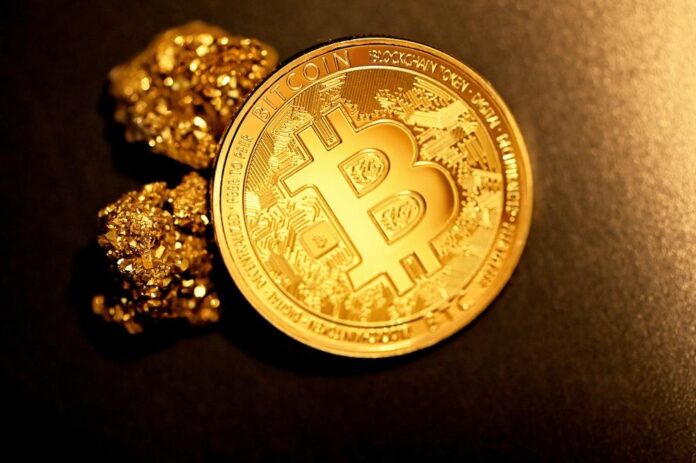
In an era where investment opportunities are the order of the day, and individuals seek the best ones to protect their money from devaluation or generate income, deciding among the numerous options can be challenging. Gold has always been considered a reliable asset for its incorruptible nature and ability never to lose value. Still, there’s a burning dilemma in finance: which will prove the better investment? Looking at their past performance, we can see that both assets witnessed a price increase in March after the collapse of several banks. After the unavoidable market turbulence that impacted the finance world, Bitcoin bounced back and saw its price rise by more than 80%. However, the answer to the question needs more analysis than looking at the commodities’ performance.
Bitcoin has long been dubbed “digital gold” or gold 2.0 by crypto supporters, given the advantages only this precious metal provides. But since they are different assets with different scopes, how can an investor determine the better choice? Here is what you should know about them.
A brief history of Gold and Bitcoin to understand their purposes
Gold has often been the preferred currency throughout history for its anti-corrosive properties, difficulty to obtain, scarcity, and malleability. While it has long been used for trading goods, it was in the 1870s that it was transformed into an international standard and basis for the monetary system. The Gold Standard linked a state’s money supply to Gold, acting as the backbone for the global economic system throughout time.
While Gold undoubtedly serves a wide range of purposes, it’s safe to say that the financial system had limitations that needed to be overcome, issues posing threats to financial security, and more.
To minimize some of the challenges encountered, a brilliant team of developers or individuals known under Satoshi Nakamoto gained inspiration from previous unsuccessful attempts to create cyber money and gave birth to Bitcoin.
This decentralized technology and payment system ushered in a new era of investing and financing. When the pandemic forced numerous economies to shut down, investors and analysts observed that Bitcoin’s value held steady in the face of depreciating stock prices.
This led to immense amounts of money poured into Bitcoin, growing institutional interest in building funds and investment instruments, and positive media exposure. All of these inevitably led to the golden momentum Bitcoin had in April 2021, when its price surged to $61.000, hitting $69.000 later in November.
If we compare the performance of Gold and the reigning cryptocurrency since Bitcoin’s inception in 2009, we can conclude that none of them were disappointed in protecting wealth. Yet, there’s more to it than preservation to determine which fits your investment portfolio better.
Bitcoin vs. Gold at a Glance
Gold has often been hailed as a significant hedge against inflation as it doesn’t lose its purchasing power in time. It has represented a store of value for millennia, being used as a currency and having real-world issues and tangible value. Its limited supply differentiates it from fiat currencies but brings it together with Bitcoin, another finite asset.
There can’t be mined, and more than 21 million bitcoins circulated, which makes it a limited digital asset. Some pundits predict that when BTC hits its 21-coin limit, its price will boom as institutions and individuals have grasped its advantages for the financial system, more governments regulate it, leading to increased adoption, and the population will be more educated.
While it’s true that decentralized finance brings numerous benefits, like transparency across the system, self-custody of wallet, permissionless access to DeFi applications, and independency from central oversight and institutions, it’s not enough to presume that Bitcoin will generate fortunes. There’s also a risk that Bitcoin investments will go differently than planned, as nothing can offer a glimpse into the future or predict what will happen with such a volatile market.
Here’s a list of similarities between the two commodities to understand where they meet each other halfway:
- Limited supply. As mentioned, the world can’t have infinite Gold and Bitcoin. On the one hand, Gold is scarce as it’s a precious metal, which is one of the driving factors for its value. However, it has an ever-expanding nature as gold deposits keep being discovered and extracted, as there are supposedly 52,000 tons of unmined resources. On the other hand, Bitcoin was developed with a hard cap of 21 million to make it a rare commodity that might see price increases if there’s demand in the future. The last token might see the light of day around 2140, which drove the token’s value increase.
- Speculation. The idea behind purchasing a speculative asset is to profit from price ups and downs. Speculative investing means investing in risky instruments based on price fluctuations instead of solid fundamentals. Bitcoin, famously known for its volatility, is a speculative asset. While Gold isn’t as hailed for its volatile nature as BTC, it is still deemed as a speculative asset because it’s generally bought in the hopes of providing gains in the long term.
- Durability. None of these assets can be destroyed. Bitcoin can’t perish, and given the decentralized nature of the blockchain, it will survive forever. However, just like Gold, it can be stolen or lost and almost irrecuperable.
Past performances
The resiliency and good performance of Bitcoin over the past few months of 2023 inflict hope that a bull run is just around the corner. While this winter lasted a little longer than most investors expected, experienced crypto connoisseurs know that new markets with a long way to go until maturity generally go through longer bear phases than well-established traditional instruments. At the same time, the incidents of 2022 that sent shockwaves well into 2023 couldn’t leave the token unmarked.
On the other hand, Gold doesn’t see such wild fluctuations, which is also why generating profit from it is less likely. It has been touted as a way to protect investors from inflation, but it doesn’t necessarily mean that it’s the way to go if you have other goals behind your desire to invest in one of them.
Last words
Neither Bitcoin nor Gold can be declared the best investment instrument. You can compare them to oranges and apples, meaning that deciding on one of them depends on your long-term goals, conducted research, and desired timeframe, as well as your risk tolerance.










